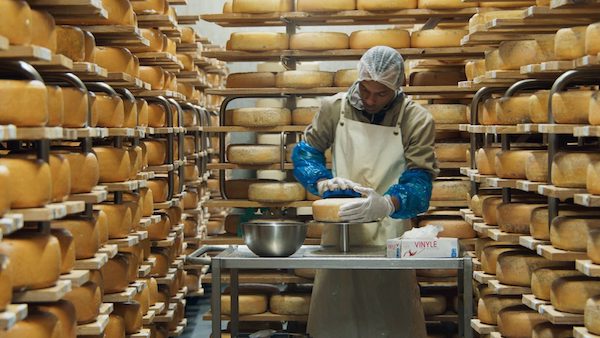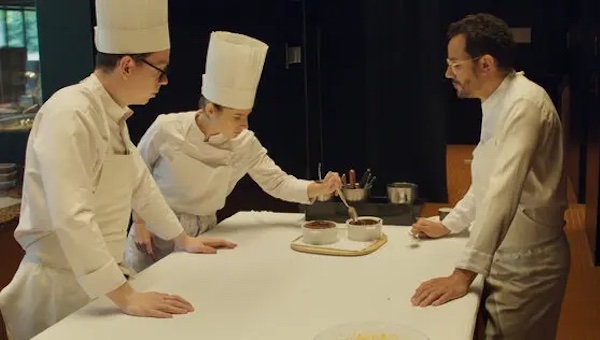Film Review: Quality Time in French Foodie Heaven
By Gerald Peary
Frederick Wiseman’s latest documentary — an immersive visit behind the scenes of a three-star Michelin restaurant — is a savory, irresistible treat.
Menus-Plaisirs-Les Troisgros, directed by Frederick Wiseman. Screening at New York’s Film Forum through December 12.

A scene from Menus-Plaisirs-Les Troisgros. Photo: Zipporah Films
If you are any kind of foodie — it’s inexplicable to me that many people aren’t — block off four full hours of your busy life for an immersive visit behind the scenes of a three-star Michelin restaurant. Sit down to Frederick Wiseman’s savory, irresistible documentary, Menus-Plaisirs-Les Troisgros. I came to Wiseman’s 44th nonfiction work as a salivating voyeur, someone who has never been feted at even a one-star Michelin eatery. So what pleasure to observe the Troisgros family — master chef Michel and his chef sons, Cesar and Leo — lording over extraordinary meals in the vicinity of Roanne, France, 65 miles from Lyon. The Troisgos clan operate three fine-dining restaurants, but most of Wiseman’s screen time is spent at the flagship La Maison Troisgros.
Founded in 1930, the restaurant was a pioneer in creating and conceptualizing Nouvelle Cuisine and it continues cooking this austere way today. The portions tend toward petite, but every morsel you order is, guaranteed, exquisitely cooked with the most rarefied side sauce and positioned on your plate (only white plates) in the most sensuous, artistic way. See what miraculous things can be done with literally one asparagus stalk (green or white, depending on the season) with a dab of buttery cream delicately spooned on top! That might be one plate in the restaurant’s lavish tasting menu. Things aren’t cheap at Troisgros. I checked their current website. A prix fixe dinner — six plates, cheese, beverage, dessert — goes for 570 euros. For the very rich and indulgent, there are bottles of wine costing into the thousands. A learned sommelier stands by to steer you to what to drink: what superb wine to complement your food order, what prime vintage to choose, and from what trustworthy vineyard.
Wiseman plunks his camera down in the dining area to watch customers order, observing them eat and drink. There’s a snobby foursome of British businessmen who go on in the most boorish way about the wine they have smartly chosen, pushing their heads into their glasses and pretentiously sniffing the aromas. But there are also some fairly working-class people who have saved their money to come to Troisgros once in their lives for an anniversary celebration. The waiters are trained to be extremely polite to one and all, taking the effort to make everyone comfortable and also to put on a bit of a show, pointing out (pinky finger extended) every esoteric ingredient in every dish. The customers seem grateful for all of this princely attention, though some I intuit are intimidated and cowed being in such a fancy place. Class, of course, is on display at every table. Only one person we see — obviously a wealthy, privileged gentleman — dares to return a bottle of wine because the cork doesn’t smell right. The less privileged eat and drink what is before them without daring a complaint.

A scene from Menus-Plaisirs-Les Troisgros. Photo: Zipporah Films
Wiseman takes us away from the restaurant for a series of interludes showing the three Troisgros chefs visiting the farms that provide the products they cook: eggs, milk, beef, goat, and vegetables. The farmers all put on a show for the camera, offering eloquent explanations of how their agricultural way is so special. As one would imagine, each farm is a model of sustainability. Rich soil, absolutely no fertilizer. Animals running free and uncrowded eating the best grass and grain conceivable. How it should be, you’ll think, everywhere on an eco-driven earth.
But the greatest fun of this documentary is, of course, hanging out in the kitchen — a large, expansive one with long windows that open onto country greenery — and being round about for all the amazing cooking. The menu is fusion with Japanese touches, and yet at its base, very, very French. Which means lots of recipes that most Americans would gag on: intestines, brains, snails. A child customer, we learn, is expected to order frog! Canard, of course, everywhere, but what about chicken? Too plebeian? Interestingly, there are no wooden spoons in sight, only metal scraping on metal. And, shock, nobody wears gloves. Everyone touches the food with their fingers, places items on the plates with bare hands. We can only assume that these hands are washed again and again though we don’t see anyone racing to a faucet.
This is certainly the cleanest of kitchens. And if there are staff problems with drugs, alcoholism, sexual carousing, Wiseman shows none of this. It’s a very serious culinary atmosphere at Troisgros but seemingly not a toxic one. Several times, cooks are corrected a bit for making mistakes (“There are too many snails on the plate!”), but nobody is ever yelled at, singled out publicly to feel a fool.

A scene from Menus-Plaisirs-Les Troisgros.Photo: Zipporah Films
Wiseman has been making documentaries since the 1960s about “institutions,” so this film is, above all else, a portrait of a restaurant. But the director goes deeper by getting us acquainted with the restaurant’s longtime owner and chief chef, Michel Troisgros, in his 60s, and letting us see him in relation to his next-in-line chef, his 30-something son, Cesar. There’s love and respect, but also an inevitable bumping of heads. You can sense that Cesar wants to make some changes but, out of called-for respect, he has to defer to his stubborn father. And Michel just can’t help meddling, pulling rank, wanting newly developed recipes altered in the tiniest way, experimenting and experimenting while his impatient, exasperated son has to stand by.
So where are the flaws in this well-oiled machine of a restaurant? Nothing is perfect, is it? I would have liked to hear employees speak confidentially about their salaries, about work conditions. Are the women workers treated equitably? Is this a union shop? I was curious about the night staff. Are there immigrants who come in and clean the toilets? Anyway, very minor quibbles. I was superbly entertained for all four hours of Menus-Plaisirs-Les Troisgros, as the maestro documentarian at 92 returns from a forced Covid break to his sublime filmmaking. Salut, Monsieur Wiseman. More movies, Fred, more.
Gerald Peary is a Professor Emeritus at Suffolk University, Boston; ex-curator of the Boston University Cinematheque; and the general editor of the “Conversations with Filmmakers” series from the University Press of Mississippi. A critic for the late Boston Phoenix, he is the author of nine books on cinema; writer-director of the documentaries For the Love of Movies: The Story of American Film Criticism and Archie’s Betty; and a featured actor in the 2013 independent narrative Computer Chess. His latest feature documentary, The Rabbi Goes West, co-directed by Amy Geller, has played at film festivals around the world.

Gerry,
From the trailers that I have seen, this looks like a beautiful film, but is four hours rather much to watch it? At my age, I know that I would need to have a break along the way. Would I miss much in order to relieve myself? Wiseman’s stamina is impressive at 92.
Mark
I watched it last night and loved it. The four hours are relaxed and pull us in. I think an intermission would be a good idea (as I feel about anything approaching three hours or more) but if you need to go you won’t miss any plot lines. I liked the time spent at the other family restaurants not mentioned in the review. And I did wonder about the same issues Gerald brings up. This isn’t THE BEAR—- Wiseman doesn’t start such conversations. He reports on what his cameras observe though some of his films do open issues that have made them controversial. And I am curious how the subjects reacted to the film.